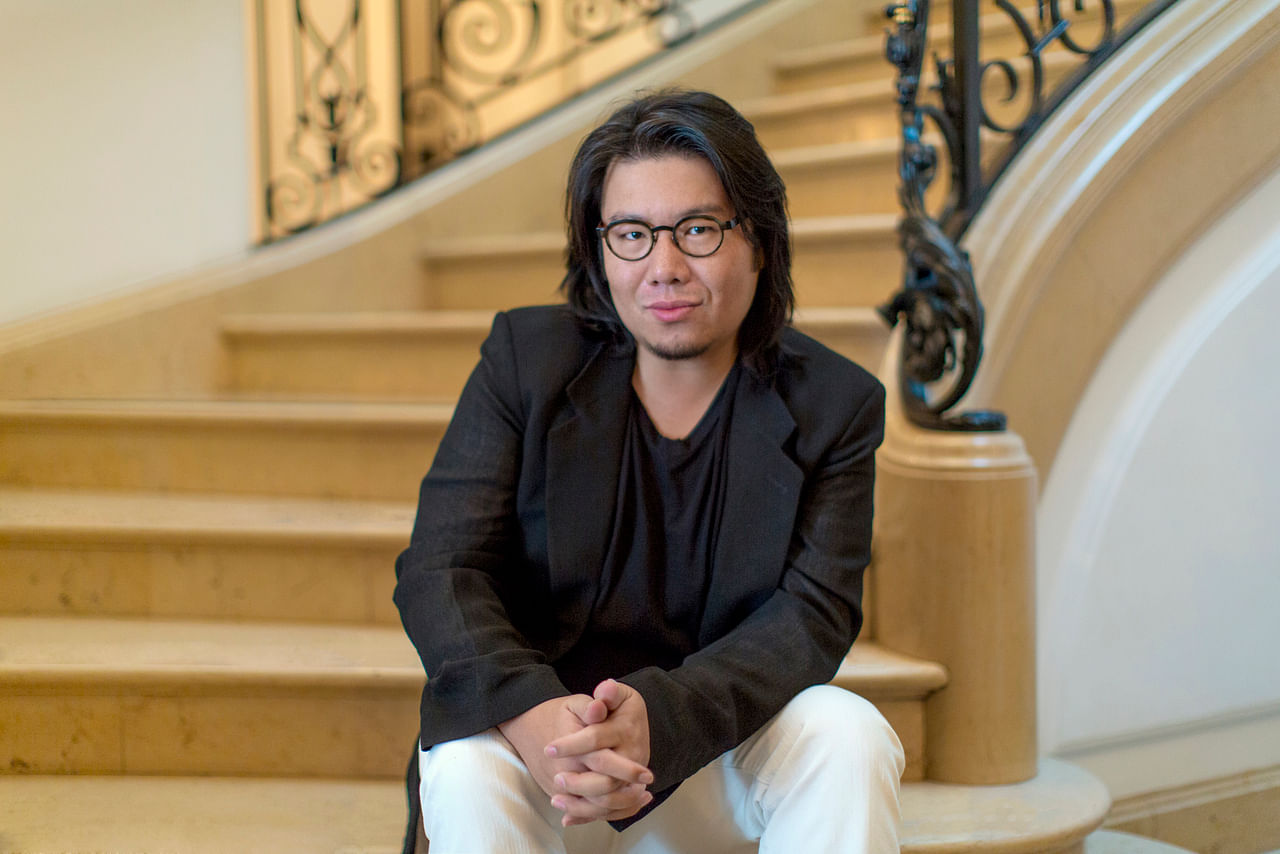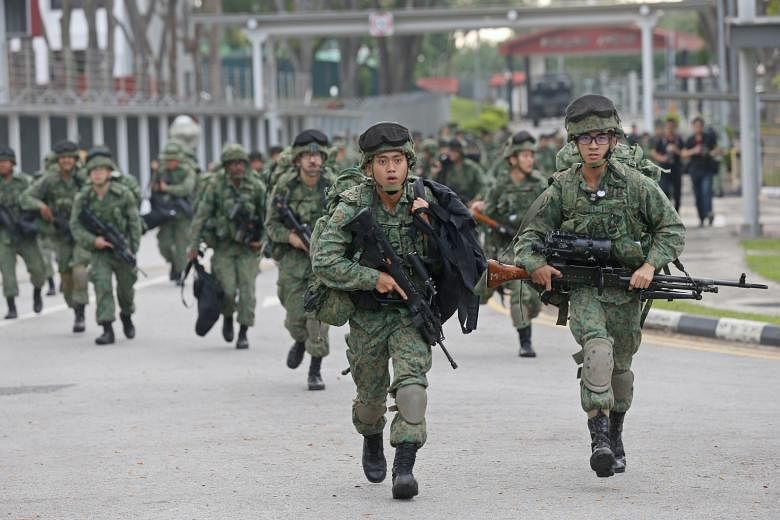SINGAPORE - National service's golden jubilee was commemorated in 2017.
Since the National Service (Amendment) Bill was passed on March 14, 1967, more than 900,000 male Singaporeans have served NS, a key pillar of defence.
But the rite of passage for men here continues to evolve.
The Straits Times reviews four key areas that have drawn attention.
1. Training safety
Training safety in the Singapore Armed Forces came under closer scrutiny with the high-profile death of actor Aloysius Pang in January 2019.
The operationally ready national serviceman was on a live-firing exercise in New Zealand when he suffered serious crush injuries while operating a Singapore Self-Propelled Howitzer.
This came after full-time national servicemen Dave Lee and Liu Kai died in 2018 in separate incidents, and Third Sergeant Gavin Chan Hiang Cheng died in Exercise Wallaby in Australia in 2017.
Since Mr Pang's death, a top-level Inspector-General's Office was set up to improve safety at all levels of the SAF, through efforts such as doing audits and assessing the safety culture at units, with the aim of achieving zero training fatalities.
No training- or operations-related death has been reported since then.
Dr Samuel Chan, a former associate research fellow from the Military Studies Programme at the S. Rajaratnam School of International Studies (RSIS), said that training safety is "care for soldiers" - one of the SAF's core values - in action, but this does not mean easier or lax standards.
"It is about removing the peripheral risks and managing the inherent risks in meeting training objectives. Training imbues personnel with the confidence to address similar risks during operations.
"This is why the SAF takes training seriously and its safety record is crucial in securing society's commitment to defence in terms of NS participation, and the recruitment and retention of regulars."
2. Defaulters
Singapore-born, best-selling writer Kevin Kwan was involved in controversy when it was revealed in August 2018 that he defaulted on his NS in 1990.
The Crazy Rich Asians author based in the United States applied and appealed to renounce his Singapore citizenship without serving NS, but this was rejected in 1994.
An average of about 350 people default on their NS requirements each year, said Defence Minister Ng Eng Hen in a parliamentary reply in 2018. They either failed to register or enlist for NS.
A sentencing framework by the High Court in 2017 introduced four tiers of punishment based on the length of the default period.
The written judgment noted that the principles affecting NS are national security; universality, where all those who are fit to serve must do so; and equity - everyone must be treated the same way regardless of background or status.
This was spelt out by then Minister for Defence Teo Chee Hean in a ministerial statement in Parliament in 2006.
Since the framework was introduced, 18 defaulters have been sentenced.

Lawyer Laurence Goh said the introduction of the framework has given more certainty to those deciding whether to return to Singapore or remain "on the run" abroad.
"The structured tier system allows those intending to come back the possibility to plan their life in Singapore or their future outside Singapore after facing the music, including serving full time if they are still eligible to do so."
He added: "For those no longer liable for full-time service, it gives them a sign of relief that there is certainty in the punishment they can expect, and their ordeal can finally be over."
3. Deferment
The issue of whether sportsmen should be given deferments to allow them to pursue their careers sparked national debate in August 2018, when footballer Benjamin Davis, then 17, had his request to defer NS denied.
He was the first Singaporean to sign professional terms with an English Premier League (EPL) club, Fulham. He became a defaulter in February 2019, when he failed to enlist.
In a 2018 Parliament speech setting out the reasons for his ministry's decision, Dr Ng said: "To grant deferment to Mr Ben Davis to pursue his personal development and professional career would be unfair to the many others who have served their NS dutifully as required, and not at a time of their choosing."
Only three sportsmen have been granted long-term deferments in the last 15 years: sailor Maximilian Soh, and swimmers Joseph Schooling and Quah Zheng Wen, to allow them to take part in the Olympics. All three have since enlisted.
Footballer Harry Birtwistle, who signed for another EPL club, Wolverhampton Wanderers, in October last year, has failed to register for NS.
Singapore Management University Associate Professor of Law Eugene Tan said NS serves a critical need for national security for a young nation state, and the exceptional nature of long-term deferment requires the process to be highly selective and stringent.
"This ensures that the fundamental principles of universality and equity, which undergird NS, are given effect to. If the onerous criteria are not adhered to, the morale and commitment to NS and the defence of Singapore would be severely weakened," he added.
"The fact that only three sportsmen have secured long-term deferment in the past 15 years testifies to the rare privilege afforded and the high demands expected of them. It has to be, or long-term deferment will be brought into disrepute."
4. Length of service
Recent developments in other countries with conscription have led some to wonder if there could be further changes in the duration of NS, which has stayed the same for 18 years.
In South Korea, a landmark Supreme Court ruling in 2018 found that conscientious objection is a valid reason to forgo military service, which is at least 18 months long.
A law which was revised in 2020 meant that top Korean pop stars can postpone their service to when they are 30.
The Israeli Defence Forces announced in 2020 that compulsory military service for males has been shortened by two months, to 30.
Meanwhile, the Taiwanese military has reduced the period of compulsory service to four months since 2013, as part of the transition to an all-volunteer force.
In 2004, NS in Singapore was reduced to a maximum of two years. This was the first major change in duration since 1971, when training was reduced from 36 to 30 months for officers, and from 30 to 24 months for those below the rank of corporal.
Mr Ian Li, an associate research fellow with the Military Studies Programme at RSIS, said there is perhaps no ideal length of service.
"Rather, this is dependent on the military's charge, context, and constraints," he said.
"Support for national service in Singapore is high largely because the necessity of maintaining a robust military option has always been clearly articulated and accepted.
"Singapore has also adjusted other supporting components of national service to better meet the requirements of a conscript force, such as through improvements in wages, equipment, training and increased flexibility in terms of vocational assignment."


